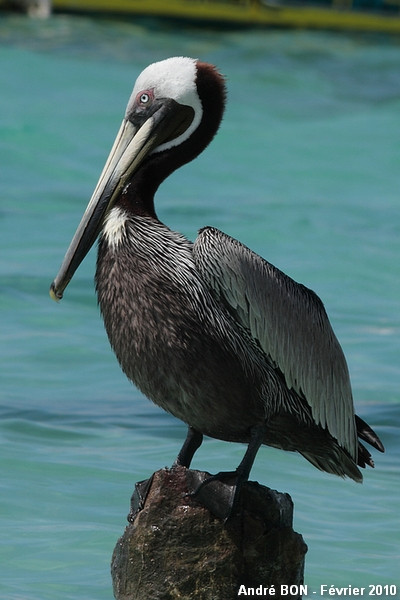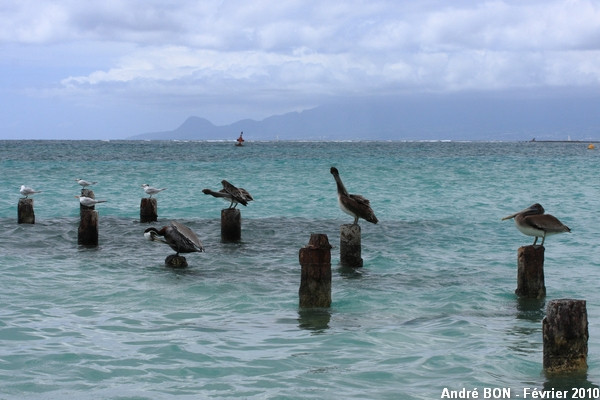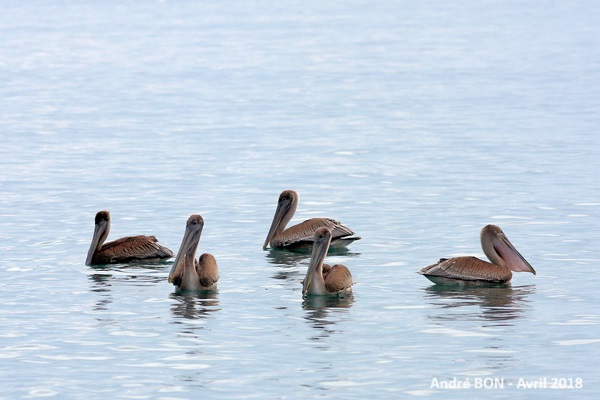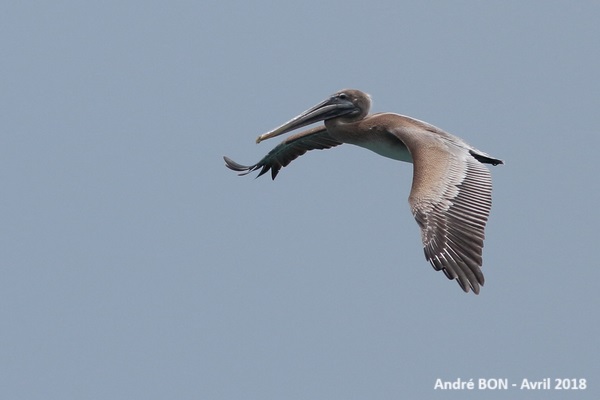












| Brown Pelican (Pelecanus occidentalis (Linnaeus, 1758)) |













|
|
Scientific name: Pelecanus occidentalis (Linnaeus, 1758) Common name: Brown Pelican French name: Pélican brun Order: Pelecaniformes Family: Pelecanidae Size: Body size: 105 to 135 cm; Wingspan: 200 to 220 cm; weight: 6,5 to 9 kg. Habitat: Hot coastal waters, mangrove forests, lagoons and ponds. The brown Pelican never flies far from the sea shore. It particularly prefers small rocky islands. Food: Mainly fishes captured by diving head first form a height of about 7 metres. The preys are captured in the expandable throat pouch. The Brown Pelican can also occasionally feed on carrions. Nesting: Brown Pelicans nest in colonies on the trees of rocky islands or in mangrove forests. They sometimes nest on the ground too. Males build a platform with small branches and twigs with a depression in the centre. Females lay 2 to 3 eggs at a variable period of the year depending on the location. The male and the female alternatively sit on the eggs. The parents feed the juveniles by regurgitating food until they are able to fish. Migration: Sedentary. Geographic area: Coasts of North America, Central America and South America. The Caribbean and the Galápagos Islands. |
The Brown Pelican is a large bird with short greyish black legs, webbed feet and a long bill, pale or dark depending on the region, above a brownish expandable pouch. The head is white, the neck is white and brown. The upper side of the body is grey striated with brown. The under side is dark brown. Juveniles are dark brown with white on the under side of the body. They get their adult plumage after 3 years. |
| [To know more about the Brown Pelican] [Next picture] [Top] |

|
The village of Sainte-Anne on the Guadeloupe island is well known for its beautiful white sand beach. I have done there nice bird watching sessions between two baths. A small flock of Brown Pelicans has posed for the picture near the beach. |
| [To know more about the Brown Pelican] [Next picture] [Previous picture] [Top] |

|
The Brown Pelicans were accompanied by Royal Terns and Magnificent Frigatebirds which were fishing in the neighbourhood. I regret having preferred bathing instead of taking pictures of these Frigatebirds. I need to travel there again!! |
| [To know more about the Brown Pelican] [Next picture] [Previous picture] [Top] |

|
The Brown Pelican Family poses in front of the Soufrière volcano, hidden under the clouds. You can easily recognize juveniles with their upper part dull brown colour and under part white colour. |
| [To know more about the Brown Pelican] [Next picture] [Previous picture] [Top] |

|
This Brown Pelican will soon dive to fish. Several of them will do the same at the same place. This is certainly due to the presence of a shoal of small fishes. |
| [To know more about the Brown Pelican] [Next picture] [Previous picture] [Top] |

|
This was a good subject to try the high speed continuous shooting mode in order to get a picture of the Pelican just before hitting water. Unfortunately the memory card was almost full and everything was already packed inside my luggage. The airplane back to metropolitan France was planned to take off in just a few hours. |
| [To know more about the Brown Pelican] [Next picture] [Previous picture] [Top] |

|
This juvenile Brown Pelican does a little balancing act at the beach of Grande Anse d'Arlet. |
| [To know more about the Brown Pelican] [Next picture] [Previous picture] [Top] |

|
The webbed feet do not seem to be a problem for perching on small supports. |
| [To know more about the Brown Pelican] [Next picture] [Previous picture] [Top] |

|
We had the pleasure of attending (and participating in) a beach seining session at Anse Turin near Saint-Pierre. Brown Pelicans came to participate but you have to fight to keep your prey. |
| [To know more about the Brown Pelican] [Next picture] [Previous picture] [Top] |

|
And that's it, the fish is inside the pouch! |
| [To know more about the Brown Pelican] [Next picture] [Previous picture] [Top] |

|
Return to calm after fishing. |
| [To know more about the Brown Pelican] [Next picture] [Previous picture] [Top] |

|
The numerous Brown Pelicans attracted by seining make it easy to shoot many photos. Here's one in flight. |
| [To know more about the Brown Pelican] [Next picture] [Previous picture] [Top] |

|
Another view of Brown Pelican in flight. |
| [To know more about the Brown Pelican] [Previous picture] [Top] |

|
Here is the normal method of catching fish, by diving. |